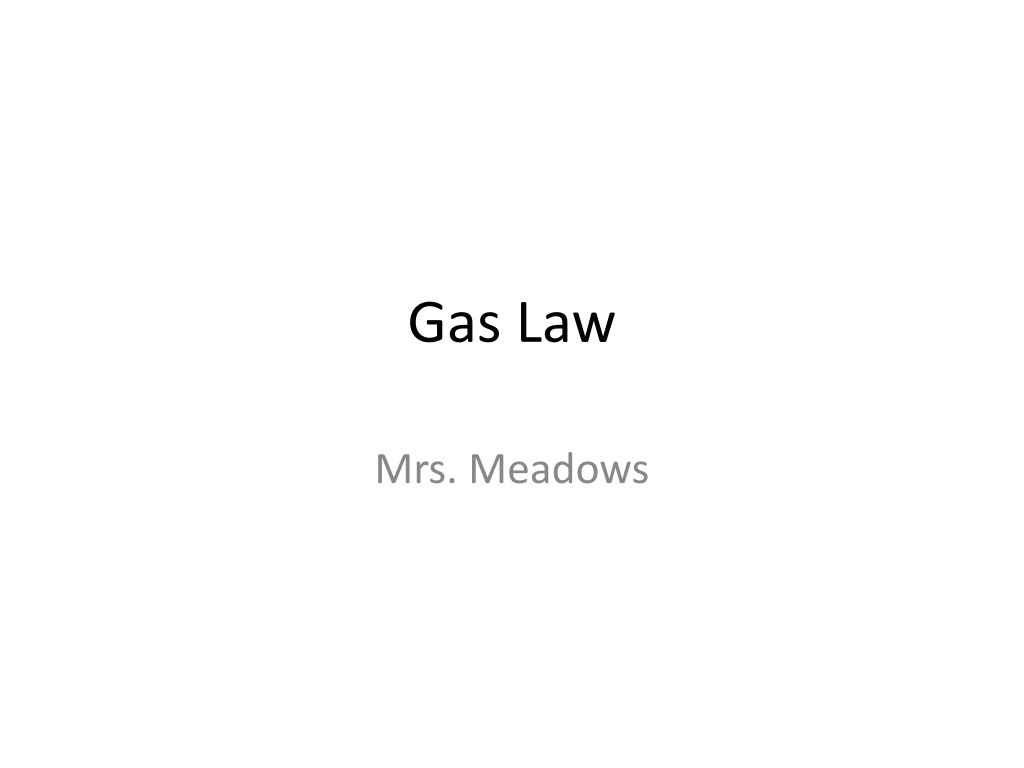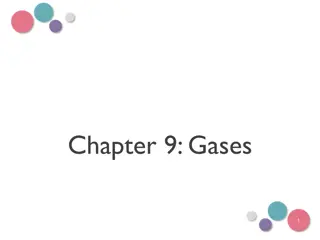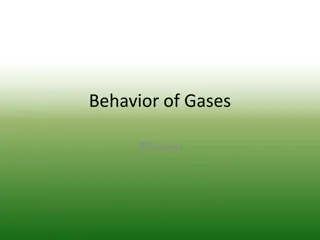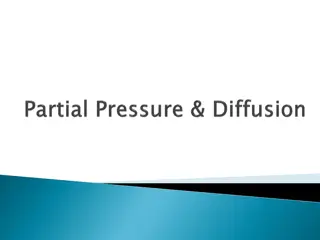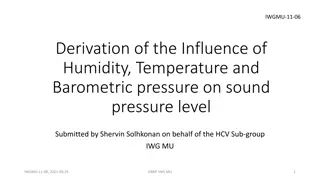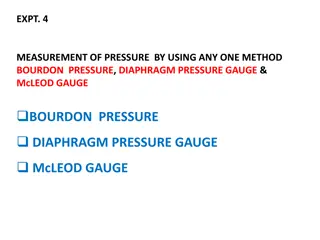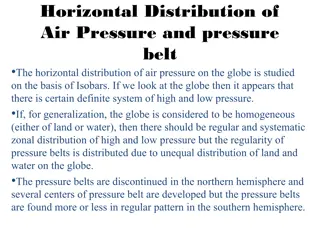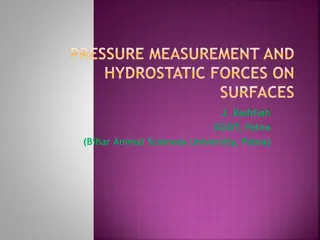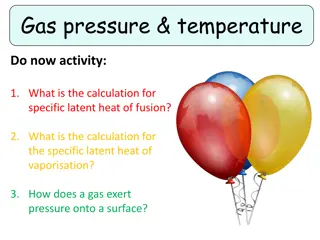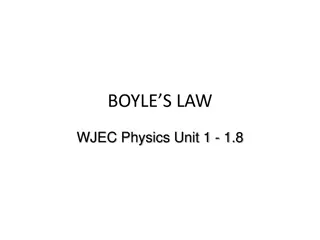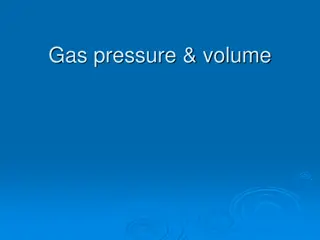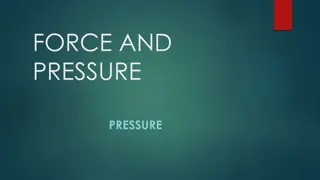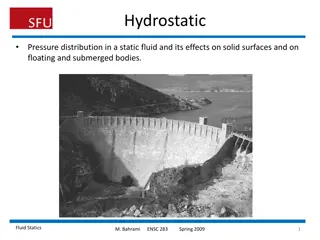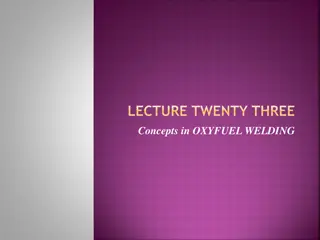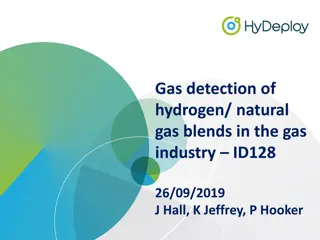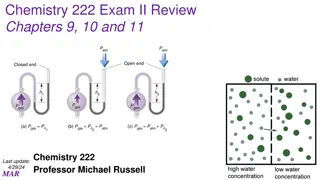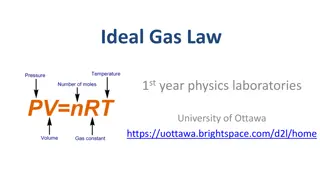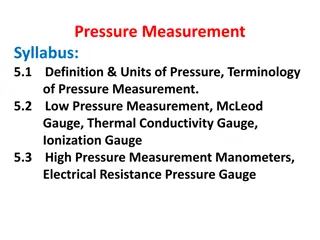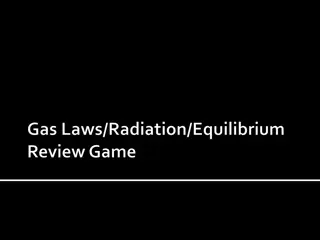Understanding Gas Laws and Pressure Units
Gas laws relate pressure, volume, and temperature of gases in various units like atmospheres (atm), mmHg, kPa. Standard pressure is 1 atm with conversion factors. Understanding concepts such as STP, volume, temperature, and Dalton's Law of partial pressure is crucial for solving gas law problems. Examples and formulas illustrate how to convert pressure units and calculate partial pressures in gas mixtures.
Download Presentation

Please find below an Image/Link to download the presentation.
The content on the website is provided AS IS for your information and personal use only. It may not be sold, licensed, or shared on other websites without obtaining consent from the author. Download presentation by click this link. If you encounter any issues during the download, it is possible that the publisher has removed the file from their server.
E N D
Presentation Transcript
Gas Law Mrs. Meadows
What is Pressure? Pressure force extended on something Pressure (P) will have different units throughout this unit HOWEVER the unit you must use is (atm) Standard pressure = 1 atm conversion factors 760 mm Hg = 1 atm 101.3 kPa = 1 atm
Converting units of Pressure How many atm is 780 mmgH? How many atm is 104.23 kPa? https://www.youtube.com/watch?v=ELNEqTZ yhxw
examples 340 mmHg = _____________ atm 204 kPa = ________________ atm https://www.youtube.com/watch?v=7cfcFegx 9b4
What is STP? Standard temperature and presssure 0 Kelvin and 1 atm
What is volume? Volume- How large something is The units can be in liters (l) or milliliters (ml)
What is temperature? Temperature- how hot something is The standard unit of temperature is 273 K All temperature must be converted to Kelvins Kelvin = 0C + 273
What is Daltons Law of partial pressure? The pressure of each gas in a mixture The total pressure of a mixture of gases is equal to the sum of the partial pressures of each gas in the mixture
What is the formula? Ptotal= P1+ P2+ P3+ . . .
Example 1 Ptotal= P1+ P2+ P3+ . . . Ptotal = 2.4 + 6.0 = 8.4 atm PH2 = 2.4 atm PHe = 6.0 atm
Example 2 If the total pressure of a mixture is 16.7 atm and the partial pressure of gas 1 is 5.6 atm and gas 2 is 4.76 atm, what is the partial pressure of gas 3? https://www.youtube.com/watch?v=TpYR4v- 3IMg
What is Boyles Law Relationship between Volume and Pressure The pressure of gas is inversely related to its volume. If volume decrease, the pressure increases.
What is the formula? P1V1 = P2V2 Where P is the pressure and V is the volume
Example 1 What is the new volume (L) of a 8.0 L sample of gas if the initial pressure is at 550 mm Hg after its pressure is changed to 2200 mmHg? https://www.youtube.com/watch?v=noVzvUJ uxJw
Example 2 A gas occupies 16.2 liters at .749 atm. What is the pressure if the volume becomes 18.2 L? https://www.youtube.com/watch?v=DJtCZ8a65 24
Example 3 At an unknown pressure a gas in contained in 6.5 L. However, at standard pressure, its volume was measured to be 8.00 L. What was the unknown pressure? https://www.youtube.com/watch?v=KKeZBgHD _go
What is charles law? Relationship between Temperature and Volume Temperature of a gas in kelvin is directly related to the volume When the temperature increase so does the volume
What is the formula? V1T2 =V2T1 Where T in temperature (K) and V is volume
Example 1 A balloon has a volume of 785 mL at 21 C. If the temperature drops to 0 C, what is the new volume of the balloon? https://www.youtube.com/watch?v=KnHT0wmu Kj4
Example 2 If 14.1 liter of hydrogen at 26.0 C is expanded to 70 liters, what must the new temperature be? https://www.youtube.com/watch?v=KnHT0wmu Kj4
Example 3 The temperature of a 4.60 L sample of gas is changed from 16.0 C to 27.0 C. What will the volume of this gas be at the new temperature? https://www.youtube.com/watch?v=97Uqh_g28 fk
What is Gay- Lussac Law? Relationship between Pressure and Temperature When pressure and temperature are directly related When the pressure increases the temperature will also increase
What is the formula? P1T2 = P2T1 Where P is pressure (atm) and T is temperature (K)
Example 1 A gas has a pressure of 6.58 kPa at 540 K. What will the pressure be at 210. K? https://www.youtube.com/watch?v=jfin- MwoUwQ
Example 2 Hydrogen has a pressure of 799.0 mm Hg at 55.0 C. What is the temperature at standard pressure? https://www.youtube.com/watch?v=c0nWAZZb Q_4
Example 3 If argon is cooled from 383.0 K to 273.15 K, what final pressure would result if the original pressure was 1.64 atm? https://www.youtube.com/watch?v=YEslriDHn4 w
What is the combined gas law? Is used when there is a change in volume, temperature, or pressure
Example 1 A toy balloon has an internal pressure of 1.05 atm and a volume of 5.0 L. If the temperature where the balloon is released is 20 C, what will happen to the volume when the balloon rises to an altitude where the pressure is 0.65 atm and the temperature is 15 C? https://www.youtube.com/watch?v=3rW- SiQtEdg
Example 2 What is the volume of gas at 3.40 atm and 400.0 K, if its original volume was 500.0 L at 0.250 atm and 500.0 K? https://www.youtube.com/watch?v=rHSVytU PN98
Example 3 Carbon monoxide gas occupies 1.25 liters at 25.7 C and 1785 mm Hg. Determine the temperature at which the gas will occupy 6.250 L at 1.50 atm. OMIT (DO NOT WORRY ABOUT THIS PROBLEM)
What is the formula for ideal gas law? PV = nRT Where P is pressure (atm) V is volume (L) n is mole R is 0.0821 T is temperature (K)
Example 1 What is the number of moles of a gas that is at 29.0 C and 106.75 kPa and occupies 70.3 L? https://www.youtube.com/watch?v=QDol4ZTM nkM
Example 2 0.36 moles of CO2is contained in a 4.00 L container at 27.0 C. What is the pressure in this container? https://www.youtube.com/watch?v=jlaWE- Ulj28
Avogadro's Law Back to moles Remember 1 mole = 6.02 x 1023 particles 1 mole = molar mass New: 1 mole = 22.4 L
Example 1 Convert 4.38 x1023 molecules of CO to Liters. https://www.youtube.com/watch?v=2yOY-- rvT9g
Example 2 4.467 liters of oxygen are in a container. Covert this amount to grams. https://www.youtube.com/watch?v=ySzd_EA UQBo
Example 3 How many liters of CO4 are in 3.74 moles? https://www.youtube.com/watch?v=COZNLA6 6LUE
